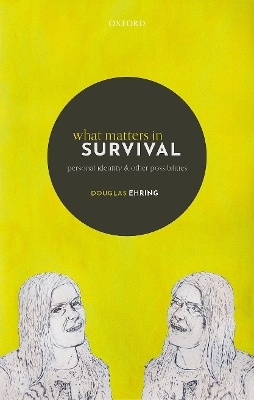
What Matters in Survival
Personal Identity and other Possibilities
Seiten
2021
Oxford University Press (Verlag)
978-0-19-289471-7 (ISBN)
Oxford University Press (Verlag)
978-0-19-289471-7 (ISBN)
What matters in survival? What relation to a future individual gives you a reason for prudential concern for that individual? According to Douglas Ehring's radical view, nothing matters in survival: there is no relation that gives you a basic, foundational normative reason for prudential concern.
This study is about what matters in survival--about what relation to a future individual gives you a reason for prudential concern for that individual. For common sense there is such a relation and it is identity, but according to Parfit common sense is wrong in this respect. Identity is not what matters in survival. In What Matters in Survival, Douglas Ehring argues that this Parfitian thesis does not go far enough. The result is the highly radical view “Survival Nihilism,” according to which nothing matters in survival. Although we generally have motivating reasons to have prudential concern, and perhaps even indirect normative reasons for such concerns there is no relation that gives you a basic, foundational normative reason for prudential concern. This view goes beyond what Parfit calls the "Extreme View." It is the "More Extreme View" and is in effect something like an error theory about prudential reason as a special kind of normative reason.
This study is about what matters in survival--about what relation to a future individual gives you a reason for prudential concern for that individual. For common sense there is such a relation and it is identity, but according to Parfit common sense is wrong in this respect. Identity is not what matters in survival. In What Matters in Survival, Douglas Ehring argues that this Parfitian thesis does not go far enough. The result is the highly radical view “Survival Nihilism,” according to which nothing matters in survival. Although we generally have motivating reasons to have prudential concern, and perhaps even indirect normative reasons for such concerns there is no relation that gives you a basic, foundational normative reason for prudential concern. This view goes beyond what Parfit calls the "Extreme View." It is the "More Extreme View" and is in effect something like an error theory about prudential reason as a special kind of normative reason.
Douglas Ehring is the William Edward Easterwood Professor of Philosophy at Southern Methodist University. His publications include Tropes (2011) and Causation and Persistence: A Theory of Causation (1997).
Introduction
1: The Divergence Argument
2: Fission and Shared Stages
3: Fission and Indeterminacy
4: Generalizing from Fission
5: The Triviality Argument
6: The Non-Triviality Principle and Objections to its Application
Epilogue: Possible Implications for Rationality and Ethics
Bibliography
| Erscheinungsdatum | 07.07.2021 |
|---|---|
| Verlagsort | Oxford |
| Sprache | englisch |
| Maße | 145 x 224 mm |
| Gewicht | 398 g |
| Themenwelt | Geisteswissenschaften ► Philosophie ► Metaphysik / Ontologie |
| ISBN-10 | 0-19-289471-4 / 0192894714 |
| ISBN-13 | 978-0-19-289471-7 / 9780192894717 |
| Zustand | Neuware |
| Haben Sie eine Frage zum Produkt? |
Mehr entdecken
aus dem Bereich
aus dem Bereich
Buch | Hardcover (2024)
Matthes & Seitz (Verlag)
CHF 41,90
Über konstruktivistisches Denken in der Theologie
Buch | Softcover (2024)
Verlag Herder
CHF 79,95


